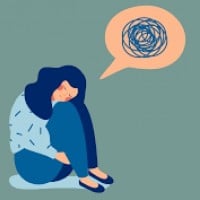Top 10 Things That Most Lead to Depression
Depression is not a pretty thing. It can suck people in like a black hole, and it's very hard to get out of. Sometimes it can lead to awful health issues, and even to death. But, how do we prevent this from ever occurring? Well, to know that, you have to know what causes depression, which can vary from Grief to Lack of Sleep to even Genes! Here, I can hopefully help out some of your future selves by quickly counting down the top ten things that can most lead to depression!Additionally, if you happen to be going through depression now, and are having trouble identifying the cause, I hope this list will help you out. As usual, enjoy, but take this list seriously.

Major events in you personal life are huge ways to get depressed, such as moving, retiring, losing a job, or getting a divorce, which makes sense as these will impact your life, possibly in a bad way. But, astonishingly, even good events like getting married, getting a new job, or graduating can cause depression. For pretty much all of these, depression isn't a super normal response, by which I mean common, but it happens quite a bit, as these are very stressful life events, whether good or bad, and when they're stressful on a big, big scale, your body might naturally respond with something like clinical depression. But usually it's not a good if you find that you've gotten depressed from one of these, because it could mean you're not happy with your new job, or not exactly happy, though maybe satisfied, with your marriage, or it could be because you feel now there's nothing to do in life after getting through a big thing like graduating, and that can lead to depression.

One of the most obvious items on the entire list, sadness or grief after the death or loss of a loved one, while completely natural in every way, can definitely lead to depression. It makes complete sense, and unlike some of the other items on this list, it's all natural, but it is still a huge factor. What you need to do in this case is remind yourself that death is natural for everyone, and that you were lucky to have so much time and happy moments with your loved one before they went. Everyone dies. If that doesn't work, don't try and bottle it all up, seek help from other loved ones or a therapist, you don't have to feel ashamed about it, everyone understands how bad it is to lose a loved one.

Abuse is yet another obvious item on the list. Emotional, physical, or psychological abuse can really cause a bad mental state very quickly, or sometimes, years later. Depression is one of the most common ways your body reacts to abuse, and really any abuse can trigger it, whether online, in-person, or whatever. If you're being abused by anyone you have contact with you need to reach out to other people to prevent this. There are many organizations and groups dedicated to helping people through tough times in life like abuse, and reaching out to them is a good solution.

Surprisingly, completely unrelated medical conditions can make it much, much more likely for you to get depression, and are one of the absolute biggest ways to get it. Just as depression itself can lead to other medical conditions. These include diabetes, which may not be physically related but psychologically, because, I mean, if I got it I'd be very, very upset, and I'm sure it can lead many to the brink of depression. Heart disease, arthritis, and kidney disease can all directly or indirectly cause it, and I think that arthritis is similar to diabetes in that psychological way while the other two can physically cause depression. HIV and AIDS, lupus, and multiple sclerosis can all cause it as well. Now, having one of these diseases doesn't necessarily mean you're 100% gonna be depressed, but it will increase the likeliness of getting depressed and the seriousness of the depression you're going through. I count myself lucky enough to not suffer of medical conditions or depression, but to those who have both of them, you have to cling to happy memories and thoughts, because depression can lead to suicide or major health problems, and we can't let that happen.

There have been so many times that people have been pushed to depression or suicide because they've felt really lonely, sometimes as a result of neglect, other times a result of isolation. There's a reason why people living alone are much more likely to get depression, and that's because loneliness is often a big factor or the main factor when it comes to depression. People who don't have people to talk or interact with in a positive and productive way can often deteriorate in a mental state until they end up being depressed, have suicidal thoughts, and need lots of help to come out. If you're feeling lonely, try to open up about it, it's not good to keep it a secret or quiet.

It's usually temporary though.
Overworking unfortunately occurs quite often without anyone but the person in question knowing it's happening, and sometimes the person themselves doesn't know just how large and unmanageable their workload is. Overworking is sometimes even unnecessary, but people generally feel that they "have to" keep working nonstop, and unfortunately in these cases, depression will appear in enormous quantities. Much like substance misuse, in the case of overworking people know they have to stop but they can't, and it gets harder and harder to fight against their own urges that many people in both of these cases will be pushed very quickly to depression, and sometimes even to stuff as serious as suicide. What I have to say if you're feeling depressed about way too much work, as well as anxious and stressed, is that you have to tell someone, whether it's your boss or loved ones. Only they can help you out of this, you can't do it all by yourself.

Surprisingly, gender plays a very large role in depression. Women are, astonishingly, two times more likely to become depressed than men are. People may dismiss this saying that it may be due to sexism and prejudice against the gender, but please. Women definitely need just the same rights as men do, but sexism has nothing to do with depression in this case, at least not on as large a scale. The reason is that women experience much different and more drastic hormonal changes than men do, which happens the most during puberty and after pregnancy, and apparently these hormonal changes are basically a trigger of depression.
One of the absolute biggest reasons on here is substance misuse. If you don't know what that means, I'll quickly explain it now. Substance misuse is basically the use of alcohol, drugs (illegal or legal), or prescriptions/medications in a way that they aren't meant to be used. Many people resort to drinking too much or misusing drugs and medications to try and deal with stress or anxiety, and while it seems like the only way out, it's actually one of the worst things to possibly do. You quickly get addicted to it and slowly your mental health will deteriorate and almost definitely cause depression. Even if it seems like taking drugs or meds and drinking lots of alcohol helps you in the short-term, over time it will make your depression worse and worse.
Quite surprisingly, another huge factor to depression is poor nutrition. If you have low amounts of carbohydrates, it can actually trigger something in your brain that can accelerate and make it more likely to get depression. Not only does nutrition help your physical health, it's actually vital to your mental health as well. Lots of researchers who spend lots and lots of time working on this have noticed that poor diets lead to worsening and worsening mood disorders, one of the biggest examples being depression. Make sure that your diet is balanced with lots of carbs to balance the proteins, and make sure you're getting enough of everything. I'm no health expert, but imbalances in food can be very bad for you.
Surprisingly, family genes can make it much easier for you to be susceptible to depression, and sometimes may even cause it without a decipherable cause, because your genes just make it so you must have depression sometime as a reaction to even the littlest thing. If none of the other factors on this list seem to attribute to you, this may be your problem. There are a few ways, however, to check if this may be the case. If you have a family history of your genes, meaning if your parents, or their parents, or other close relatives have struggled with depression a lot, even if it's just on one side of the family, that could mean it's genes. It's very complicated as to what kind of depression you may suffer if it has to do with genes, and even what the future effects may be, but it's clear that this can be a direct, indirect, or factor into many people with depression.
The sun has a vitamin called "Vitamin C" which helps you stay happy and outgoing. If you don't get enough of this, it can lead to depression.

Personally think this needs to be higher considering a good number of people get depressed. The notion of comparing one another can create a toxic environment. Humans have a natural sense of seeking validation, and social media amplifies that problem, hence why people feel the sense of "missing out".
Social media can lead to toxic standards that make people have low self esteem and high, impossible ideas of an ideal life that often lead to depression.

Can confirm; I am the one who stays up.
Religion gives you a purpose although frowned upon in todays society